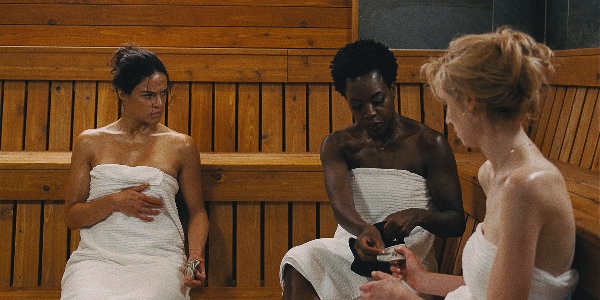If Widows had a color, it would be gunmetal gray. Steve McQueen’s film starts with an explosive car chase and ends with another. Along the way, this moody, fleet-footed story of four women out for revenge—and big money—offers up a dark, tarnished reflection of a caper flick. It’s also a political thriller and a story of overlapping lives that connects its dots coolly and ruthlessly in ways you don’t see coming.
The opening sequence links intimate domestic scenes of four Chicago couples, intercut with a wild car chase that ends in a gruesome explosion. We piece together that the men killed in a daring robbery left behind Veronica (Viola Davis), the slow-burning wife of the ringleader (Liam Neeson); fragile abuse victim Alice (Elizabeth Debicki); and single mother Linda (Michelle Rodriguez). These women are very different, in personality and background, but they’re all about to find the one thing they have in common that the dead men have left them—hell on earth. They’re saddled with debts, blindsided by secrets, and now creeps of all kinds are sniffing around for the money their husbands stole. Against the odds, Veronica assembles the crew to pull off their own heist and take back a cool $5 million. They are joined by another single mom, Belle (Cynthia Erivo).
This summary makes the story sound simple. It’s not. A busy plot and glancing social commentary keep Widows’ wheels turning fast. The women tangle with a sleazy politician (Colin Farrell) pushed by his power-hungry father (Robert Duvall) into a racially charged faceoff with another corrupt candidate (a menacing Bryan Tyree Henry), while a dead-eyed hit man on the gang’s tail (Get Out’s Daniel Kaluuya) performs acts of sadism with Reservoir Dogs–style panache. Dirty money pervades a hair salon, an old-timey black church, and fancy hotels, where one of the quartet tries her hand at sex for hire. Director McQueen’s wide-ranging camera takes in multiple insider views of Chicago at all levels of race and class, and a flashback scene keeps the film’s politics painfully contemporary.
Widows somehow manages to stay on track with so many different elements in play so that the movie emerges as more controlled than it looks. It takes a while to figure out the characters’ twisted relationships, and the gradual discoveries give the plotlines depth. Although the would-be robbers toss off a few good lines, they are not motivated by the usual heist-pic high spirits or any sense of feel-good sisterhood. Bitter desperation drives this crew, making the stakes far higher than in most examples of the genre. The robbery they carry out is suspenseful, violent, and gratifying.
Finally, the actors propel the movie with their presences alone. Davis’s scowl expresses flabbergasted grief that can turn into a threat on a dime. Looking like a pulled-taffy Catherine Deneuve rendered by society Mannerist painter John Currin, Debicki cocks a sharp eye for opportunities that belies Alice’s helplessness. And Erivo, who won a Tony for The Color Purple, shows off impressive strength and speed in an almost wordless though physically demanding part. All these characters seem as rattled by Widows’ betrayals, shocks, and setbacks as we are. With this film, we and they are in for a fast and sometimes very cold ride.







Leave A Comment